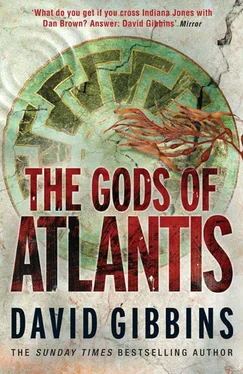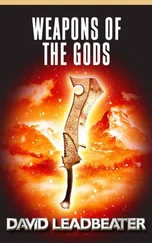David Gibbins - The Gods of Atlantis
Здесь есть возможность читать онлайн «David Gibbins - The Gods of Atlantis» весь текст электронной книги совершенно бесплатно (целиком полную версию без сокращений). В некоторых случаях можно слушать аудио, скачать через торрент в формате fb2 и присутствует краткое содержание. Жанр: Прочие приключения, на английском языке. Описание произведения, (предисловие) а так же отзывы посетителей доступны на портале библиотеки ЛибКат.
- Название:The Gods of Atlantis
- Автор:
- Жанр:
- Год:неизвестен
- ISBN:нет данных
- Рейтинг книги:3 / 5. Голосов: 1
-
Избранное:Добавить в избранное
- Отзывы:
-
Ваша оценка:
- 60
- 1
- 2
- 3
- 4
- 5
The Gods of Atlantis: краткое содержание, описание и аннотация
Предлагаем к чтению аннотацию, описание, краткое содержание или предисловие (зависит от того, что написал сам автор книги «The Gods of Atlantis»). Если вы не нашли необходимую информацию о книге — напишите в комментариях, мы постараемся отыскать её.
The Gods of Atlantis — читать онлайн бесплатно полную книгу (весь текст) целиком
Ниже представлен текст книги, разбитый по страницам. Система сохранения места последней прочитанной страницы, позволяет с удобством читать онлайн бесплатно книгу «The Gods of Atlantis», без необходимости каждый раз заново искать на чём Вы остановились. Поставьте закладку, и сможете в любой момент перейти на страницу, на которой закончили чтение.
Интервал:
Закладка:
‘I’m supposed to be the one watching out for you, not the other way around.’
‘Now you see why I didn’t want you to come here.’
They both stood up. Hiebermeyer winced as he tried to flex his injured wrist, and then relaxed his arm in the sling. The jeep that had brought Jack from the Tornado was waiting again outside the Portakabin, and they walked towards it. Jack looked at the bubble over the bunker, trying to imagine what lay inside. Hiebermeyer stopped and stared at it. ‘This place,’ he jerked his head, ‘this is what most people imagine the worst of war is all about. This is war spread beyond the battlefield to its worst excess, to genocide. But the place we’re going to now, to the heart of Nazi Germany, we have a word in German for what went on there. We call it Gesamtkrieg.’
Jack nodded. He knew what that meant.
Total war.
PART 2
12
Berlin, the Zoo flak tower, 0930 hours, 1 May 1945
Oberstleutnant Ernst Hoffman put down his pencil and clapped his hands over his ears, waiting for the terrible vibration to pass. Each time the flak guns on the roof fired a salvo they sent a titanic groan through the structure, and then an aftershock that seemed to set on edge every iron bar in the thousands of tons of ferroconcrete that made up the walls. It had been just about bearable while the guns were doing the job for which they had been designed, firing up at the waves of enemy bombers that had pounded Berlin for months, but now that the barrels were depressed to aim into the city at the advancing Russians they were straining the tolerance level of the gun platforms. The engineers who had built the tower could never have imagined that the defence of Berlin would come to this. The tower itself might survive the onslaught, a gargantuan five-storey structure like a medieval keep, but for the thousands of desperate people cowering inside, survival could only mean a matter of hours, a day or two at most. Here in this chamber on the second floor, Hoffman was insulated from the worst of the vibration, but the noise in the open stairways was appalling, shattering eardrums and shaking the fillings from teeth. To those trapped below it must have seemed like the final act of the apocalypse, a ghastly orchestral denouement to the Third Reich.
They called it the Zoo tower because it stood in the grounds of the Berlin Zoo, now a scorched battleground on the edge of the Tiergarten, the huge park in the centre of Berlin. On the other side of the Tiergarten lay the Reich Chancellery, with the Fuhrerbunker beneath it, and north of that the Reichstag and Gestapo headquarters. Together they formed the last bastions of the Third Reich. The Zoo tower even had its own water reservoir, dug deep into the bedrock, and secret tunnels leading out under the Tiergarten. The garrison commander had told him that the tower could last for weeks, even months. But his calculation had been based on the normal garrison of 350: the Luftwaffe flak gunners and the medical staff in the eighty-bed hospital on the floor above Hoffman. The hospital now held more than a thousand wounded and sick, and the lower floor and stairwells were crammed with more than thirty thousand civilians. Hoffman shook his head. Thirty thousand men, women and children.
He caught a glimpse of his reflection in the polished metal of the crate beside him. His face looked long, angular, distorted by a dent in the metal, almost as if he had taken on the features of the Stuka dive-bomber that had been his home for almost five years, from his first missions over England in 1940 to the flaming wreck in Poland six months before, from Blitzkrieg to Gotterdammerung. He had grown from youth to man in that machine, from innocent to killer. A man becomes one with his weapon. He shifted slightly, wondering if that reflection could really be him. His skin was pale beneath his swept-back hair, ghostly in this light. Ever since being grounded and arriving in Berlin five months ago, he had felt as if the blood had been sucked from him. He flexed his fingers, feeling their strength. At least he had not gone to pieces like so many of his comrades in his Stuka squadron. And there was still one final task to carry out.
He watched the shadows cast by the candle tremble on the walls. The room was large, sepulchral, the walls of stark concrete, in places flaked with paint that had been shaken loose by the vibrations. Directly in front of him a closed door opened on to a spiral staircase that led up to the gun platform on the roof and down to the seething mass of humanity below. When the order had reached him two days ago from Gestapo headquarters to report to the tower, they had offered him Goebbels’ rooms next door, where the propaganda minister had briefly held court as Reich Commissar for the Defence of Berlin before running to hide in the Fuhrerbunker. Hoffman had refused, on the grounds that Goebbels might return, but in truth he could not bear to have his command post where that monster had been. And he had all he needed here: a couple of crates and a few planks to make a desk, a box of candles, ledger books to write in, a folding army cot against the wall, a bucket in the far corner with a makeshift wooden cover over it.
The breakdown in sanitation had been frightful. Diehard Nazis had used the lavatories as places to commit suicide, barricading themselves inside and blowing their brains out amidst the squalor, their bloated corpses still there. And the food supply had dwindled to virtually nothing. Hoffman’s orderly had brought him his last meal the night before: a bowl of Wassersuppe made from potato peelings and beetroot, along with half a bottle of schnapps. He looked at the bottle on his desk, still untouched. He needed a clear head for what was to come. And alcohol had been part of the scourge of Nazism. They were all drunk, the architects of this monstrosity, the gods of National Socialism, cowering in the Fuhrerbunker. Alcohol had fuelled the self-pity, the rage, the fantasies of victory that had brought Hitler’s dream of a thousand-year Reich to this frenzied climax of self-destruction and horror.
He heard the dull thud of a pistol shot through the wall, then another. He closed his eyes for a moment, steeling himself. He knew what was happening. Half an hour before, on his way down the stairs from the gun platform, he had stood back as two Feldgendarmen had appeared, the hated military police. They were dragging a man between them, his jacket painted crudely with the letter H for Hungary. The man was one of the foreign labourers who had been used to clear refuse from the tower, before that job became futile. The Feldgendarm colonel called them the wily Greeks, the warriors of the Trojan Horse, a concealed enemy who would reveal themselves as the Russians moved in. Some of the labourers had removed the clothing with the painted letters and disappeared into the mass of people below, but others had kept their identity, imagining that the liberating Russians would treat them as heroes. Now they were paying the price for letting the Feldgendarmen see that too. The door to Goebbels’ office complex had been open, and Hoffman had seen the drawn pistols. He wanted to go in and scream at them: The Fuhrer is dead. Why more killing? It is over. But to intervene would have been suicidal. And in truth it was not over, not yet. He had to keep his nerve for what lay ahead.
Another pulverizing shudder coursed through the tower. Hoffman pressed his elbows against the planks that formed his desk, trying to stop the vibrations from shaking them off the crates at either end. He peered again at the crate to his left, where he had seen his reflection in the metal. It was covered with stamps and inspection marks, with an inventory of the contents, all the usual evidence of Reich bureaucracy. He knew that this had been an official storage room for works of art, waiting for the time when Hitler’s grand scheme for a Fuhrermuseum in his home town of Linz in Austria would be realized. The room had been used since 1941 to house treasures from the Berlin museums, in one of the few places thought to be impregnable to Allied bombing. Several months ago, Reichsleiter Bormann and his henchmen had removed most of the treasures to a salt mine in Austria. Hoffman had snorted when he heard that. During his posting in Berlin over the last few months, he had got to know these people close-up. Bormann knew that Hitler’s days were numbered and was undoubtedly securing his own loot. The three crates that remained had apparently been left on the express instructions of Reichsfuhrer Himmler, who had ordered a museum official, a Dr Unverzagt, to watch over them. Hoffman had found the man camped out here with the crates when he had arrived forty-eight hours before. Unverzagt had been one of Himmler’s stooges, a member of the Ahnenerbe – Himmler’s absurd ‘Department of Cultural Heritage’ – and Hoffman had instantly disliked him. But the man had left with no protest and had disappeared into the throng of desperate civilians below. Hoffman could not imagine any treasure valuable enough to induce someone to linger in that hellhole, and he was sure that Unverzagt would have bolted from the tower while there was still a chance before the Russians closed in.
Читать дальшеИнтервал:
Закладка:
Похожие книги на «The Gods of Atlantis»
Представляем Вашему вниманию похожие книги на «The Gods of Atlantis» списком для выбора. Мы отобрали схожую по названию и смыслу литературу в надежде предоставить читателям больше вариантов отыскать новые, интересные, ещё непрочитанные произведения.
Обсуждение, отзывы о книге «The Gods of Atlantis» и просто собственные мнения читателей. Оставьте ваши комментарии, напишите, что Вы думаете о произведении, его смысле или главных героях. Укажите что конкретно понравилось, а что нет, и почему Вы так считаете.












